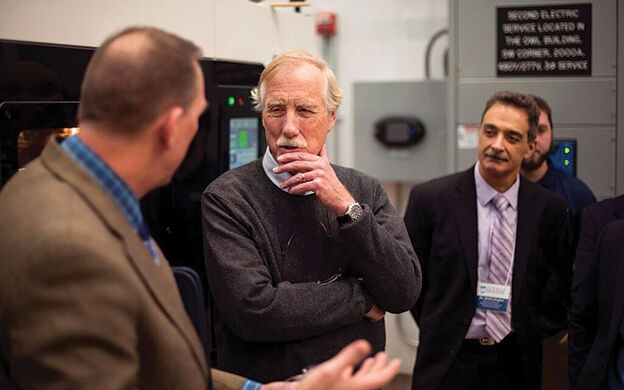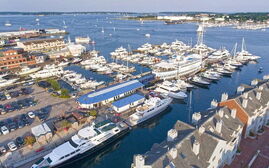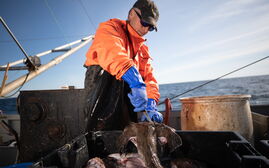King concerned about natural-gas dependence, U.S. power-grid security
 Courtesy / University of Maine
U.S. Sen. Angus King says Maine's reliance on natural gas, with its volatile price and limited pipeline capacity, is the state's top energy challenge.
Courtesy / University of Maine
U.S. Sen. Angus King says Maine's reliance on natural gas, with its volatile price and limited pipeline capacity, is the state's top energy challenge.
U.S. Sen. Angus King, I-Maine, an energy-industry veteran who served as governor from 1995–2003, says that while Maine's energy market is in relatively good shape, he's concerned about the state's overreliance on natural gas and New England's pipeline shortage. He spoke to Mainebiz by phone on June 20 from Washington, D.C. Following is an edited transcript.
Mainebiz: What are the most pressing challenges facing Maine's energy market?
Angus King: I think the Maine energy market is actually in pretty good shape. We have customer choice for wholesale power, and the grid is in relatively good shape. In the long run, probably the biggest challenge we face is our reliance on natural gas, which is a fossil fuel with a volatile price. No. 2, because of our dependence on natural gas and the relative tightness of the pipeline system in New England, it creates a situation of very high prices and shortages in the winter, where prices can just go through the roof. That creates a problem for industry as well as homeowners.
MB: And your solution to these challenges?
AK: It's important to be constantly seeking to diversify supply of power, whether it's hydro, biomass, wind or natural gas. Secondly, I think we need to work with our neighbors in New England for some way to deal with the winter shortage problem. It could be additional pipeline capacity or it could be gas storage capacity.
MB: You're a big supporter of UMaine's Aqua Ventus offshore wind project. What's at stake for Maine?
AK: The offshore wind potential is gigantic. There's a real opportunity for an industry here. Particularly if you're talking about floating turbines, then you're talking about equipment that could conceivably be towed into shore and maintained. I see a potential for economic benefits to Maine as well as the energy benefits. The big qualifier right now is that offshore wind is not competitive in terms of cost, but it only becomes so with if we have projects like Aqua Ventus to teach us what works and what doesn't. Eventually, what drives prices down are economies of scale when an industry develops.
MB: Can anything be done to support solar beyond the 30% federal tax credit?
AK: Those tax credits are important, but in the long run what's more important is to resolve the friction between our utilities and solar. We've got to find a way to have the utilities and the solar industry find common ground in order to provide homeowners and communities with another option and with choices and with a fair allocation of the cost of and benefits of solar.
MB: A year ago you and others introduced legislation to protect the electric grid from cyberattacks. How urgently does this need our attention?
AK: It's one of the most urgent problems we face from a national security point of view. The grid is vulnerable and we have to be aware of the danger that we face. We are pretty sure that the Russians have twice knocked out portions of the Ukrainian grid, and I believe that they were practicing. The good news is we have the most advanced grid in the world; the bad news is it makes us asymmetrically vulnerable to an attack.
MB: You also introduced a bill to promote personal energy independence. How would this work in practice?
AK: The basic idea is to make it clear that consumers have the right to generate their own power. That can be some kind of arrangement with the utility where, for example, they'll generate power during the day and buy power at night — not just solar but distributed energy, which includes solar. It could also be a home wind mill, or it could be what's called demand response, where at times of peak demand you get paid to turn off your hot water heater or you turn your thermostat up on your air conditioner to save power during peak times. This is also a national security issue, because if the grid is more decentralized, it's harder to knock out. That makes the grid more resilient.
MB: On climate change, does the administration's decision to pull out of the Paris accord raise any warning signs for Maine?
AK: Yes. It was a terrible decision, in my opinion, in large measure because climate change is literally a global problem, and it can only be solved globally. With our pulling out, my concern is that there's a danger the international agreement will unravel and we'll be faced with an accelerating problem of climate change, which is already affecting Maine. It's already affecting the Gulf of Maine, it's already affecting the lobster fishery, it's affecting the oyster industry in the Damariscotta River. We're a coastal state, so changes in sea level, which are now predicted to be very significant over the next 70 or 80 years, are going to have a significant effect on us. It's going to cost a lot of money to protect low-lying areas of Maine. It would be more prudent to work on prevention rather than mitigation later on. Mitigation is almost always more expensive than prevention.














Comments